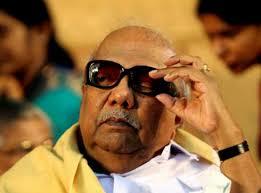
Chennai/ New Delhi, Mar 18: Hardening his stance against the Centre over the Sri Lankan Tamils issue, DMK president M Karunanidhi on Sunday went a step ahead, warning that the party will pull out altogether from the ruling UPA if the government failed to move amendments to the US-sponsored resolution on the issue at the United Nations Human Rights Council (UNHRC).
The US?is likely to table the draft resolution on Tuesday and voting may take place on Thursday or Friday.
Karunanidhi said India should indict Sri Lanka for the “genocide against the Tamil people there”. Dashing off an urgent letter to Prime Minister Manmohan Singh, copies of which were released at a press conference, he said with just a few more days left before the US resolution against Sri Lanka came up for discussion at the ongoing UNHRC meeting in Geneva, India should take the lead to incorporate key changes in it.
New Delhi, however, is unlikely to lend its voice to the clamour for an “international” probe at the UNHRC next week, though it may support the call for “credible” and “independent” investigation into the alleged war crimes in the island nation. It is likely to support the US-sponsored resolution on Sri Lanka, but is understood to be keen to ensure that it remains “non-intrusive”. Notwithstanding pressure from ally DMK, the government is unlikely to support any move that infringes on the sovereignty of Sri Lanka.
External Affairs Minister Salman Khurshid on Sunday said the government would consult the DMK before deciding on its stand.
Karunanidhi said he had written to the prime minister “with immense mental agony and feeling of having been let down by the Government of India” and urged the Centre to take immediate steps to make critical changes to the US?draft resolution before the UNHRC.
The changes should include the citing that the Sri Lankan Army had “committed genocide and war crimes” against the Tamils there, and the need for a “credible, independent, International Commission of Investigation in a time-bound manner” to enable to punish the guilty.
Significantly, Union Finance Minister P Chidambaram had hoped at a rally in Karaikudi on Saturday evening that India would vote against the island nation at the UNHRC, which possibly included a demand for an independent and international probe into the human rights violation by Sri Lanka. The senior Congress leader from Tamil Nadu had also counselled patience to one and all, including political parties and agitating students in the state till March 22.
Karunanidhi, however, did not seem convinced. “ We want the Centre to get more serious about this issue and hence our repeated reminders to them seeking those changes in the US?resolution,” he contended. Even if the US did not agree to the amendments, India’s failure to even propose such changes will amount to inflicting “severe injustice on the Sri Lankan Tamils,” the DMK chief reasoned.
“We are repeatedly knocking at the Centre’s doors, emphasising these modifications in the resolution; if no response is forthcoming, we have no option but to conclude that they (Centre) are not coming forward to secure justice for the suffering Tamils in Sri Lanka,” Karunanidhi told reporters.
“If they (Centre) do not accept our demand for the above changes in the US resolution, then it is certain that we (DMK) will not continue in the Congress-led UPA alliance,” Karunanidhi asserted. He hinted that his party was not wavering on the issue now, as it did in the past after having given similar ultimatums since 2008.
Meanwhile, students’ protests and fasts continued for the seventh day in different parts of Tamil Nadu on Sunday. A joint struggle committee of students fighting for the “cause of the Eelam Tamils” have also planned to picket Raj Bhavan in Chennai on Monday.
In Theni district down south, hundreds of plantation workers also joined the protest-fasts on Sunday. The World Thamil Organisation registered in the US, also hailed the stir in Tamil Nadu.





Comments
Add new comment